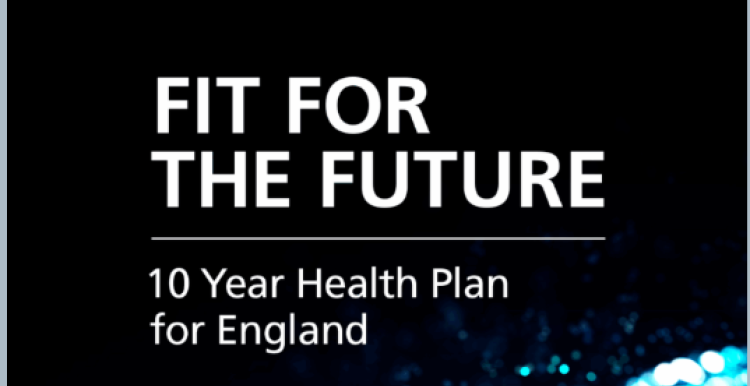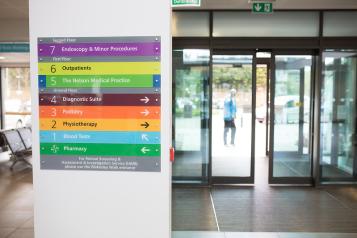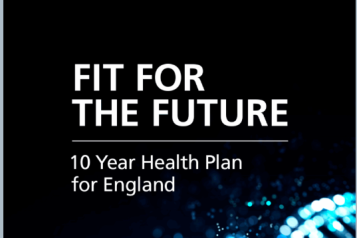“The Bonfire of the Quangos” CEO's blog on plans to close Healthwatch Milton Keynes

I’m showing my age a bit here, but the image that comes to mind when I hear the word 'quango' is always the same as the day I was first introduced to the word, and concept, as a 15 year old by Blur and their track 'Mr. Robinson’s Quango' on The Great Escape album.
From there on in - burned into my brain by that song and the positioning of the media on quangos - is the image of something dodgy, something overly bureaucratic, something underserving and undeserving.
I’m not going to argue that much of the ambition in the Government's NHS Ten-Year plan is excellent. For all intents and purposes, in some ways it feels like the government finally listened to what Healthwatch have been saying for years: listen to patients and act on their feedback. This NHS plan attempts to articulate the weaving in of large-scale patient feedback into the fabric of the NHS, as if it isn’t already there or available.
The Government justifies the abolition of feedback and oversight mechanisms, in essence because there are too many people telling the NHS to do too many things to make services better for patients, therefore crippling action and wrapping teams up in reporting and paperwork.
The rub is, a local Healthwatch rarely ‘demands’ what any of us would consider drastic and impossible action. Following observations of direct service delivery, or after hearing your experiences of care, we might ask a service to talk to elderly patients, so they know they’re a falls risk and help them manage their safety. We might say it isn’t okay for a supported living provider to register a vulnerable patient at a new GP practice without their knowledge or consent. We might ask professionals to keep a better eye on people at risk of choking when they’re eating their meals. We might ask professionals to design care plans in conversation with a patient and their carer. We might remind them that people have the right to primary care without photo identification, and we also might remind them that people who are D/deaf should be able to have a BSL interpreter in person at their appointments. Do these basic care principles need such a radical overhaul to achieve?
The plan criticises high-level patient experience data and calls out for more 'granular detail' and attempts to address what so many patients experience, that granular patient stories are often brushed aside as isolated or anecdotal. That has been the rock and the hard place local Healthwatch has existed in for 12 years. Patient experience – scaled up - is high level and unactionable. Conversely, granular detail is simply one patient issue and therefore not evidence of a need for change.
So, this plan heralds in a new era where all of us as citizens have the capacity, the resources, the capability, the motivation and the trust to provide our new AI friend with feedback on all our interactions with health services. It doesn’t touch on who will be left behind by this new era, who will be silenced, and there will be quite a few. It doesn’t really touch on any real plan to help us mere mortals to get with the programme. But payments to services could be attached to how we feed into these new mechanisms.
We know that humans aren’t simple. Our experiences, our perceptions and our capacity or style in making our views known is unique to us. If I was asked at the time, did my midwifery team deserve full payment for the birth of my second child? Despite the great care I received, I could be tempted to give them less positive feedback because they turned up mere seconds before the end, I paid for their dinner and really all they had to do was weigh my baby and go home again. I’m being light-hearted of course (they were great), but my view could have easily been something else. My feedback could have also been marred by the consultant without a name or a face, on the phone ‘trying’ to scare me off a home birth in the weeks running up to the birth.
In this new future, you will only have your local councillor or MP to appeal to where you feel your views are not heard, your needs are not met, or your safety is at risk. I would encourage everyone to pay a lot more attention to local elections in the future.
I really do hope our future “ventriloquist”, in the form of Artificial Intelligence (AI) has better luck standardising and overlaying the complexity of our experiences, against the complexity of health and care services; and that it's better at informing commissioners and service providers exactly what they should be doing for our care, support and safety.
The Government has faith in its reforms, and I truly wish them the best in delivering one of the most significant culture shifts in history. But, I fear that there could be some serious consequences.
Reading not too hard between the lines, the 10-year NHS plan marks the end of independent involvement and scrutiny by residents. No Healthwatch, no Trust governors, no Integrated Care Partnerships, no independent advocacy for your complaint to the NHS. VCSE organisations that advocate for communities could find themselves the victims of unmet need. In this new future, you will only have your local councillor or MP to appeal to where you feel your views are not heard, your needs are not met, or your safety is at risk. I would encourage everyone to pay a lot more attention to local elections in the future.
At the end of the day, it is simply disappointment that I feel. That the significant hard work of our trustees, staff and volunteers over the years which has helped so many people and influenced positive change to local culture and service delivery, has been reduced by politicians to a bureaucratic nuisance. Likewise, that most functions where residents have some level of direct oversight over those that provide their care, or the ability to speak truth to power are being dismantled.


